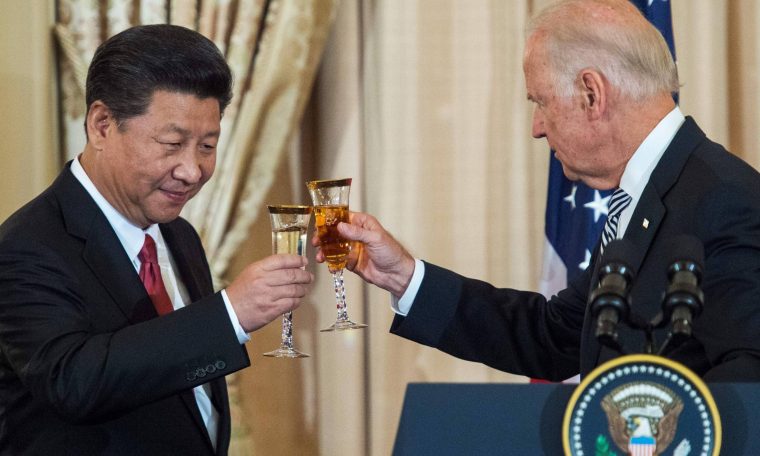
Senior US government officials regularly warn their counterparts in Latin America about China’s growing economic presence. This, according to his speech, leads to China’s dependence and growing influence on the policies of Latin American governments. At the same time, the United States is putting political and economic pressure on Latin American governments, for example, by granting 5G licenses to Chinese companies. This interference with the sovereign rights of independent states is not new to Latin America as the traditional “backyard” of northern power. But now this interference has started appearing in Europe as well.
Under the chairmanship of Joe Biden, the United States, like the European governments, once again defends a liberal world order based on rules that apply equally to all. But at the same time, the United States is willingly claiming the privilege of ignoring these rules.
This is exactly what is happening with external and unilateral sanctions against the construction of a natural gas pipeline between Russia and Germany across the Baltic Sea. The Nord Stream 2 pipeline – which will strengthen Nord Stream 1 in operation since 2012 – is 1,230 kilometers long and at the end of March, only 121 kilometers were missing. However, the United States has set a goal to prevent the final clause from being completed, with restrictions directed at companies related to the project.
The sanctions are based on an Act of the United States Congress that has a self-proclaimed purpose of protecting Europe’s energy security. If it were not for Europe, one could almost speak of neo-colonial law. The United States unilaterally defines and decides how Europe will maintain its energy security in relation to Russia and assert the right to impose sanctions on European companies. Can anyone be tempted to say who needs enemies with such friends?
Restrictions on companies specializing in pipeline placements were initially enforced under the Trump administration and expanded to a broader spectrum of companies related to the construction of the pipeline in 2021, including companies involved in project financing, insurers and certification Huh. The new Foreign Minister Antony Blinken has taken a clear stand against the project and the US government is considering the appointment of a special envoy to stop Nord Stream 2.
The German government considers external sanctions of the United States to be illegal under international law. For the United States, the imposition of fines on legitimately traded European companies is a violation of European sovereignty. In addition, the United States wants to benefit financially from the sanctions and externalize the costs of its policy against Russia.
The decision by the German government not to continue the project can be costly. Companies involved in the project can legally claim damages of around 10 billion euros. As an alternative to Russian gas, the Trump administration was promoting American liquefied natural gas (LNG), known as “gas of freedom”, prices of which are often not competitive with Russian gas. And while the United States is concerned about Europe’s energy dependence, Bloomberg reported that, by its calculations, Russian oil shipments to the United States reached a record high last year.
Russia also overtook Saudi Arabia and became the third largest oil supplier to the United States. Putin’s currency gains – in US dollars – appear to be less worrying for the United States than revenue from selling natural gas to Europe.
The pipeline will not increase Russia’s energy dependence; In the long run, natural gas demand will decline due to the transition to renewable energy in Europe. This would be a smarter and less contradictory strategy for the United States to help expedite this process. And, as an intermediate stage, natural gas is, in any case, more environmentally friendly than coal.
If the final phase of Nord Stream 2 disrupts, Russia can raise money from Ukraine by transporting less (or, in the extreme case, none) gas through pipelines that cross and supply the neighboring country. These side effects can be treated in other ways (as already done in the case of guarantees for Ukraine) and do not necessarily require the holding of Nord Stream 2.
Of course, Germany and other European countries also have objections to the gas pipeline. It is a matter of debate whether Nord Stream 2 will be remade today, from an ecological point of view. Sanctions can be justified under certain conditions, but they should not undermine the same international legal order that you wish to protect. The law cannot be retroactively applied to European companies that have committed to the project under other conditions, contracts to be respected – Russia has fulfilled its contractual obligations to Germany in the past – and National laws should not be applied to companies in countries that are third parties to behave in accordance with local laws.
If Europe cannot protect its companies from illegal US sanctions, what will happen to so-called strategic autonomy? Perhaps at the future EU-LAC summit, the issue of American crimes should be placed on the agenda and adopt a common position; Especially since the subject is not new in Latin America.
At some point, it may happen that a US senator will enact a law to protect Latin America from China and to approve companies doing business with the Asian country. Does this sound like an exaggeration? If the United States can enforce its laws in Europe as well, what prevents them from doing so in Latin America? Caution must be exercised when the United States declares its intention to protect its friends
Link current: Do you like this column? Subscriber can issue up to five free accesses per day from any link. Just click on the blue F below.



